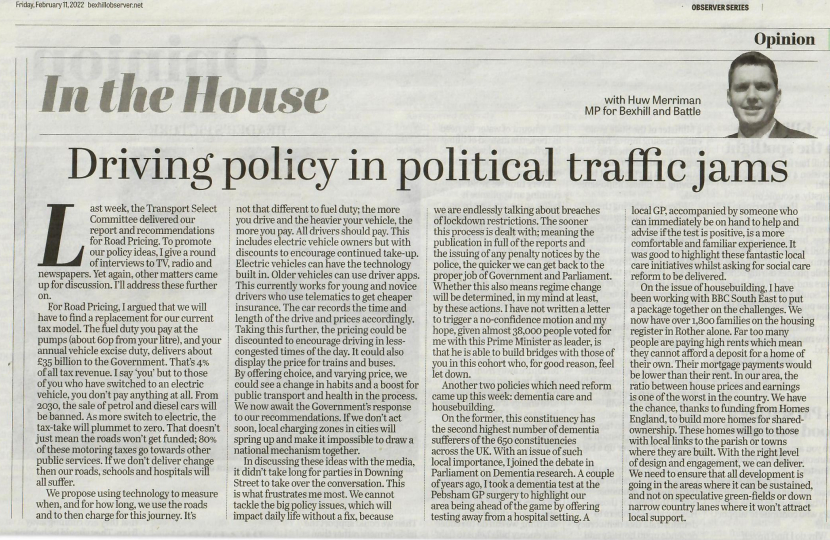
Last week, the Transport Select Committee delivered our report and recommendations for Road Pricing. To promote our policy ideas, I give a round of interviews to TV, radio and newspapers. Yet again, other matters came up for discussion. I’ll address these further on.
For Road Pricing, I argued that we will have to find a replacement for our current tax model. The fuel duty you pay at the pumps (about 60p from your litre), and your annual vehicle excise duty, delivers about £35 billion to the Government. That’s 4% of all tax revenue. I say ‘you’ but to those of you who have switched to an electric vehicle, you don’t pay anything at all. From 2030, the sale of petrol and diesel cars will be banned. As more switch to electric, the tax-take will plummet to zero. That doesn’t just mean the roads won’t get funded; 80% of these motoring taxes go towards other public services. If we don’t deliver change then our roads, schools and hospitals will all suffer.
We propose using technology to measure when, and for how long, we use the roads and to then charge for this journey. It’s not that different to fuel duty; the more you drive and the heavier your vehicle, the more you pay. All drivers should pay. This includes electric vehicle owners but with discounts to encourage continued take-up. Electric vehicles can have the technology built in. Older vehicles can use driver apps. This currently works for young and novice drivers who use telematics to get cheaper insurance. The car records the time and length of the drive and prices accordingly. Taking this further, the pricing could be discounted to encourage driving in less-congested times of the day. It could also display the price for trains and buses. By offering choice, and varying price, we could see a change in habits and a boost for public transport and health in the process. We now await the Government’s response to our recommendations. If we don’t act soon, local charging zones in cities will spring up and make it impossible to draw a national mechanism together.
In discussing these ideas with the media, it didn’t take long for parties in Downing Street to take over the conversation. This is what frustrates me most. We cannot tackle the big policy issues, which will impact daily life without a fix, because we are endlessly talking about breaches of lockdown restrictions. The sooner this process is dealt with; meaning the publication in full of the reports and the issuing of any penalty notices by the police, the quicker we can get back to the proper job of Government and Parliament. Whether this also means regime change will be determined, in my mind at least, by these actions. I have not written a letter to trigger a no-confidence motion and my hope, given almost 38,000 people voted for me with this Prime Minister as leader, is that he is able to build bridges with those of you in this cohort who, for good reason, feel let down.
Another two policies which need reform came up this week: dementia care and housebuilding.
On the former, this constituency has the second highest number of dementia sufferers of the 650 constituencies across the UK. With an issue of such local importance, I joined the debate in Parliament on Dementia research. A couple of years ago, I took a dementia test at the Pebsham GP surgery to highlight our area being ahead of the game by offering testing away from a hospital setting. A local GP, accompanied by someone who can immediately be on hand to help and advise if the test is positive, is a more comfortable and familiar experience. It was good to highlight these fantastic local care initiatives whilst asking for social care reform to be delivered.
On the issue of housebuilding, I have been working with BBC South East to put a package together on the challenges. We now have over 1,800 families on the housing register in Rother alone. Far too many people are paying high rents which mean they cannot afford a deposit for a home of their own. Their mortgage payments would be lower than their rent. In our area, the ratio between house prices and earnings is one of the worst in the country. We have the chance, thanks to funding from Homes England, to build more homes for shared-ownership. These homes will go to those with local links to the parish or towns where they are built. With the right level of design and engagement, we can deliver. We need to ensure that all development is going in the areas where it can be sustained, and not on speculative green-fields or down narrow country lanes where it won’t attract local support.



